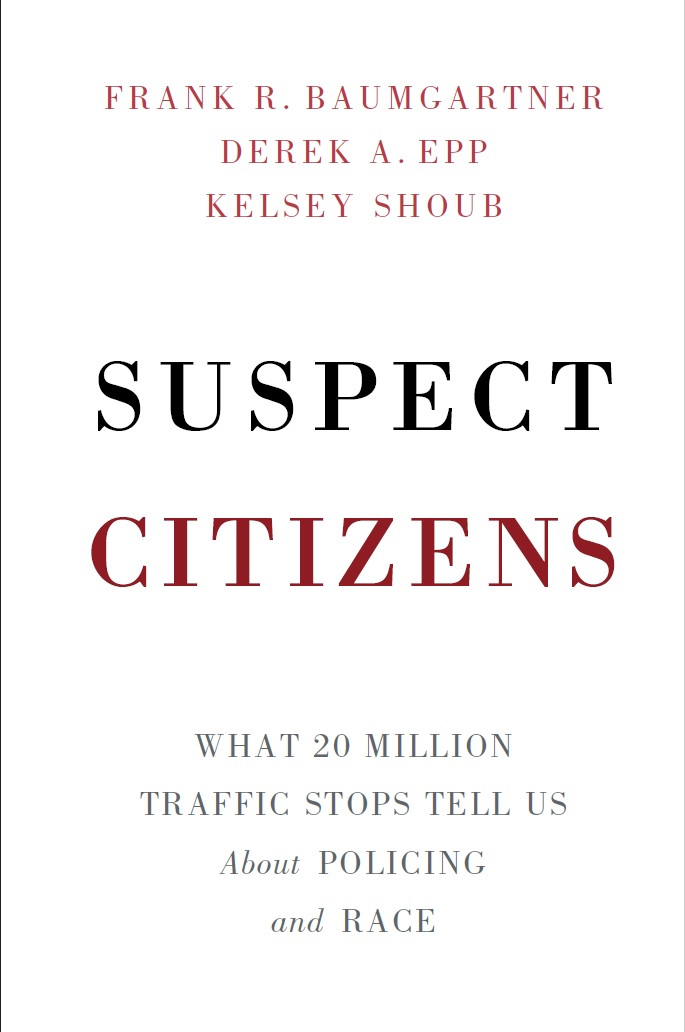Suspect Citizens
What 20 Million Traffic Stops Tell Us About Policing and Race
Frank R. Baumgartner, Derek A. Epp, and Kelsey Shoub
Cambridge University Press, 2018
Winner, C. Herman Pritchett Best Book Award from the APSA Organized Section on Law and Courts, 2019
About the Book
Suspect Citizens offers the most comprehensive look to date at the most common form of police-citizen interactions, the routine traffic stop. Throughout the war on crime, police agencies have used traffic stops to search drivers suspected of carrying contraband. From the beginning, police agencies made it clear that very large numbers of police stops would have to occur before an officer might interdict a significant drug shipment. Unstated in that calculation was that many Americans would be subjected to police investigations so that a small number of high-level offenders might be found. The key element in this strategy, which kept it hidden from widespread public scrutiny, was that middle-class white Americans were largely exempt from its consequences. Tracking these police practices down to the officer level, Suspect Citizens documents the extreme rarity of drug busts and reveals sustained and troubling disparities in how racial groups are treated.
Click here to see a 2-page summary of the book from the Scholars Strategy Network.
Click here to see a short overview of some of the main findings.
Click here to see a short overview of the findings in Chapter 8 on political representation.
Click here to see a complete update of every table and figure in the book, with data through the end of 2020. Analysis in the book runs through 2016, so this update provides 4 more years of data.
Advance praise:
By focusing on every traffic stop in the state of North Carolina from 2002 to 2016, Suspect Citizens provides unassailable evidence of racial bias in routine police-citizen interactions. This book represents a monumental scholarly accomplishment that may also lead to important public policy reforms. Vincent L. Hutchings - Hanes Walton, Jr, Collegiate Professor, University of Michigan
For well over a decade North Carolina law enforcement agencies led the nation in collecting traffic stop data as directed by state legislation. Unfortunately, neither state legislators nor law enforcement leaders understood how to interpret or use that data. Law enforcement leaders in North Carolina and across the nation can use this work to better enforce traffic safety laws while building a trusting, transparent relationship with their communities. Harold E. Medlock - former Chief of Police, Fayetteville, North Carolina
Racialized policing is one of the most pressing civil rights issues of our day. Through a meticulous analysis and sweeping examination of North Carolina’s multiyear data on traffic stops over time and across place, agency, and groups, Suspect Citizens is a deep dive into the causes and injurious consequences of racialized policing. Avoiding easy answers and delivering bold, actionable findings, Baumgartner, Epp, and Shoub capture an essential insight: that aggressive policing strategies exact a high price in community alienation but deliver precious few benefits in public safety. This book arrives at a time when our nation desperately calls out for policy solutions to racially targeted policing. Vesla M. Weaver - Bloomberg Distinguished Associate Professor, The Johns Hopkins University
Baumgartner, Epp, and Shoub highlight the different reality of driving in North Carolina faced by black, white, and Hispanic drivers. This book is a must-read for scholars and policymakers who are interested in fairer outcomes in criminal justice and in improving relations between communities of color and the officers who serve them. Traci Burch - Northwestern University, Illinois
The most complete picture we have of who the police interact with and how. Suspect Citizens combines "big data," careful thought, and meticulous and accessible analysis to offer critical insights into police behavior. Peter K. Enns - author of Incarceration Nation: How the United States Became the Most Punitive Democracy in the World and Cornell University
(This page was last updated July 30, 2021.)
